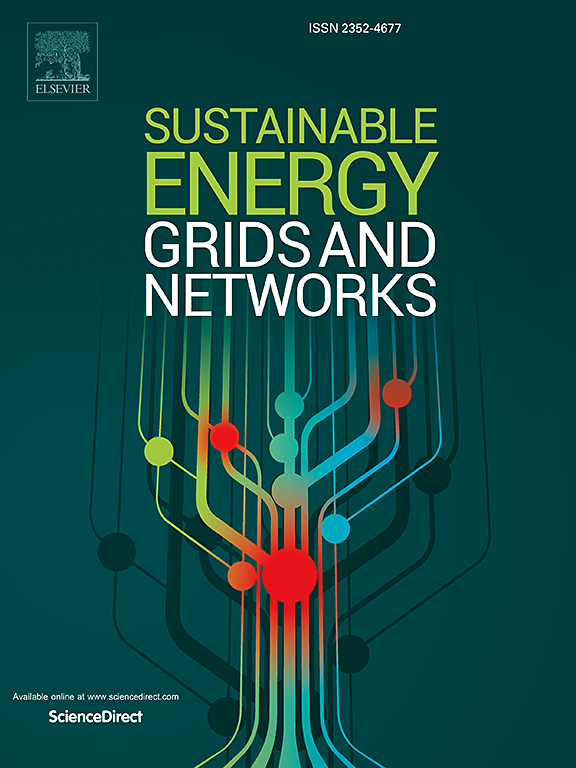Power coordinated strategy of vehicle-to-microgrid integrated hybrid AC/DC microgrids considering electric vehicles as flexible energy storage
IF 4.8
2区 工程技术
Q2 ENERGY & FUELS
引用次数: 0
Abstract
Increasing adoption of electric vehicles (EVs) entrance to hybrid ac/dc microgrids (HMGs) would provide flexible energy storage sources (FESSs) to perform vehicle-to-microgrid (V2MG) operation. However, especially in islanded mode, the state of charge (SOC) of traditional energy storage unit (ESU) approaching the critical value of charge/discharge would inevitably lead to unreliable power supply. To solve this problem, a power coordinated strategy of V2MG integrated HMGs considering EVs as FESSs is proposed in this paper. First, a joint energy storage sources (JESSs) dynamic grouping method is presented for traditional ESU and scaled electric vehicle groups (EVGs) within HMGs containing multiple subgrids, which divides ESU and EVGs into panels and sets at the same time scale. Then, the operation modes and conditions of HMGs are classified according to the power surplus/deficient state of each subgrid. Further, this paper designs response priority based on real-time grouping of JESSs to balance the SOC of ESU and formulates power coordination control strategies for abnormal SOC of ESU and subgrid power overlimit, among which the FESSs provide auxiliary service for system power regulation. Finally, the results of the simulation analysis show that the proposed strategy can achieve coordinated regulation of traditional ESU and EV as FESSs in islanded microgrids, reducing the system's dependence on traditional ESU and improving the power supply reliability of microgrid systems.
考虑电动汽车柔性储能的车-微网一体化交/直流混合微网功率协调策略
越来越多的电动汽车(ev)进入混合交/直流微电网(hmg)将提供灵活的能量存储源(fess)来执行车辆到微电网(V2MG)的运行。然而,特别是在孤岛模式下,传统储能单元(ESU)的荷电状态(SOC)接近充放电临界值,不可避免地会导致供电不可靠。为了解决这一问题,本文提出了一种考虑电动汽车为fess的V2MG集成hmg的功率协调策略。首先,提出了一种针对传统ESU和规模电动汽车组(ev)的联合储能源动态分组方法,该方法将ESU和ev在同一时间尺度上划分为面板和组;然后,根据各子网的缺/余状态,对hmg的运行方式和运行条件进行分类;在此基础上,设计了基于jess实时分组的响应优先级,实现了ESU SOC的平衡,并针对ESU SOC异常和子网功率超限制定了功率协调控制策略,其中fess为系统功率调节提供辅助服务。仿真分析结果表明,本文提出的策略可以实现孤岛微电网中传统ESU和电动汽车作为fess的协调调节,降低了系统对传统ESU的依赖,提高了微电网系统的供电可靠性。
本文章由计算机程序翻译,如有差异,请以英文原文为准。
求助全文
约1分钟内获得全文
求助全文
来源期刊

Sustainable Energy Grids & Networks
Energy-Energy Engineering and Power Technology
CiteScore
7.90
自引率
13.00%
发文量
206
审稿时长
49 days
期刊介绍:
Sustainable Energy, Grids and Networks (SEGAN)is an international peer-reviewed publication for theoretical and applied research dealing with energy, information grids and power networks, including smart grids from super to micro grid scales. SEGAN welcomes papers describing fundamental advances in mathematical, statistical or computational methods with application to power and energy systems, as well as papers on applications, computation and modeling in the areas of electrical and energy systems with coupled information and communication technologies.
 求助内容:
求助内容: 应助结果提醒方式:
应助结果提醒方式:


